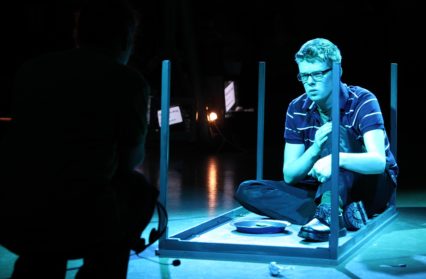Sara Rees witnessed a new production from National Theatre Wales, a fictionalised account based on the real events, of The Radicalisation of Bradley Manning.
The latest offering from the excellent National Theatre Wales is a ‘political fantasy for the networked world’. We are presented with a biography of the young Bradley Manning, incarcerated and tortured by the US government for the past 2 years as he awaits trial for the alleged leaking of over 500,000 US army reports from the wars in Iraq and Afghanistan, including the damning videos of airstrikes on civilians in Baghdad and Granai.
NTW are keen to stress that this is a fictionalised account based on the real events. While the broad facts are adhered to the dialogue has been imagined –
In the appropriately utilitarian space of the school gym hall, the set is stark and stripped back to a minimum of a few plastic chairs and a table, rearranged by the actors as each scene demands. The space is delineated by lines of tape across the floor, behind which we the audience sit, surrounding the action on all four sides. The geometry of the set, with 4 lockers set back amongst the audience, one on each side, has the eerie suggestion of the cross hairs of a target. At each corner is a scaffold post, a jumble of screens at its base, showing by turn Lady Gaga videos, computer code, the leaked Apache video footage and real-

By Tim Price,
Directed by John E McGrath
Cardiff High School, 18th April 2012
National Theatre Wales
Everything is exposed for us to see –
The play is structured as a series of short, sharp fragments, abruptly punctuated by loud bursts of the school bell, thumping beats / thrash metal and the slam of a prison cell door. It is an abrasive experience – through the use of repetition and the portrayal of bullying, aggression and moments of boredom we are given a taste of the stupidity and banality of the mundane day-
The players change roles with a simple casting off of a garment (from school uniform to army uniform) or by donning (Manning’s) spectacles, in a move that cleverly echoes the ‘I Am Bradley Manning’ movement and which the cut-
In an age of revolutions and riots, the premise of the play is a pertinent one. How did this happen? How was Bradley Manning radicalised? Who is responsible for his radicalisation? His history teacher in Wales? His father, who he was terrified of? The US college system, which Manning felt he was excluded from financially, and that the army was his only route to fulfilling his dream of studying at MIT? Manning’s homosexuality is also given attention, as are his ambitions and questioning of authority. Manning isn’t played as a particularly likeable character, at times superior and precocious, but what is conveyed is his consistent and clear belief in and commitment to fairness, justice and truth.
In asking the question of how Bradley Manning was radicalised, this piece asks how do any of us become radicalised? What is our commitment to justice and truth?
“In the 21st century, information is power; the truth cannot be hidden; and the legitimacy of governments will ultimately depend on active and informed citizens.” –
In a few days, on 23rd April 2012, Bradley Manning will stand a pre-
Audiences around the world can watch The Radicalisation of Bradley Manning viewed live stream @ nationaltheatrewales.org
You might also like…
Marine Furet reviews the first instalments of the Sherman Theatre’s innovative audio theatre series, Heart of Cardiff.
For more Wales Arts Review coverage of National Theatre Wales, including news, reviews, and interviews, click here.












